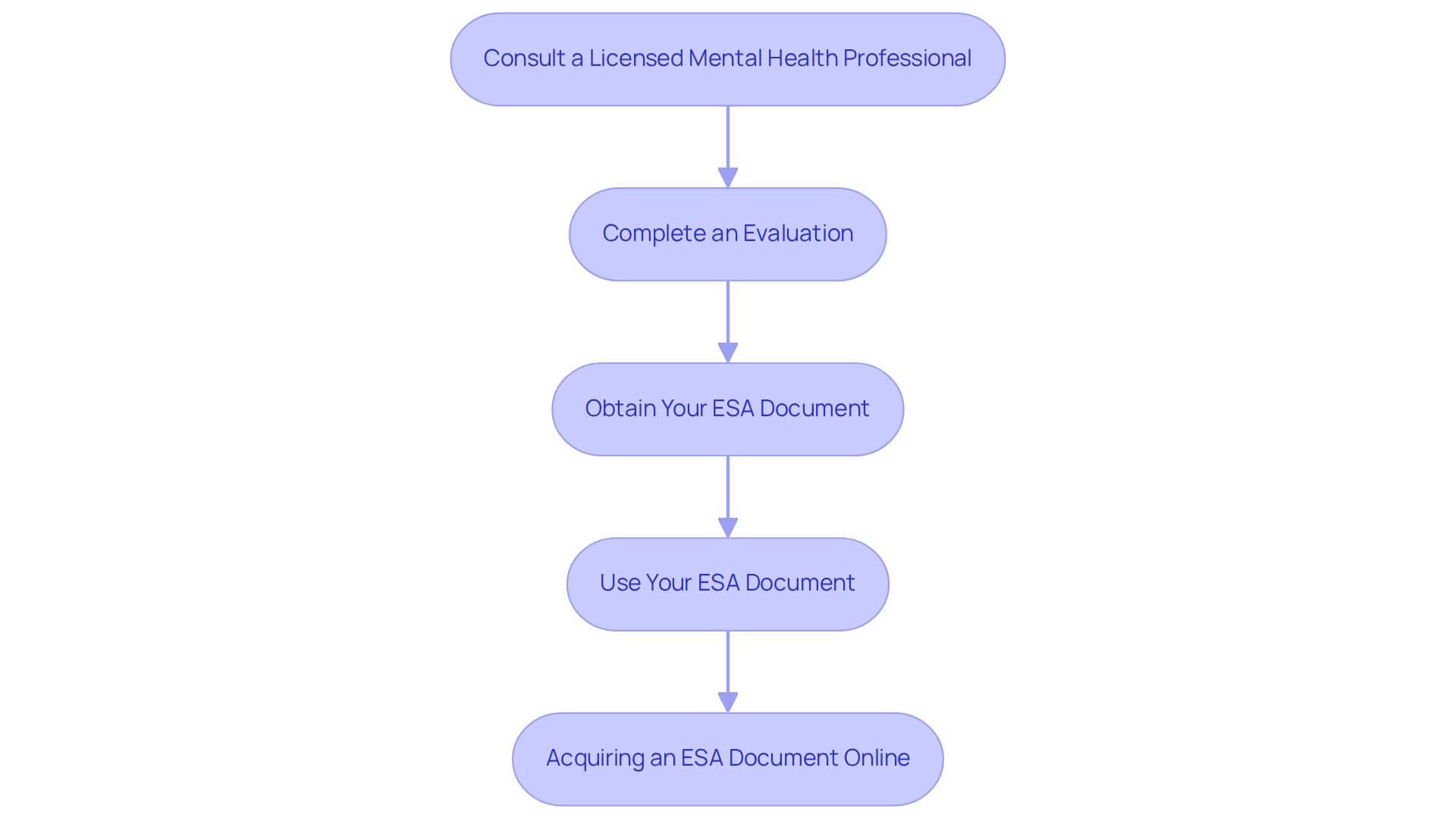

How to Get an Emotional Support Dog Letter: A Step-by-Step Guide
by Lena Park
Last updated: July 11, 2025
Verified and Approved by:
Angela Morris,
MSW, LCSW
Fact Checked

Overview
To obtain an emotional support dog letter, individuals often face emotional challenges that can feel overwhelming. Consulting a licensed mental health professional is a crucial step in this journey. This compassionate expert will evaluate your psychological condition and determine if an Emotional Support Animal (ESA) is necessary for your treatment plan. It’s important to recognize that you are not alone in this process. Many individuals experience similar struggles, and there is support available.
The article outlines a clear, step-by-step process to guide you through obtaining your ESA letter. It emphasizes the importance of proper documentation and legal compliance, ensuring that you are equipped with everything you need. More than just a letter, this process acknowledges the therapeutic benefits that ESAs provide, enhancing emotional well-being and offering comfort during difficult times.
Reflect on how having an ESA could impact your life positively. Imagine the warmth and companionship that an emotional support dog could bring, helping you navigate your mental health challenges with greater ease. Remember, this letter is not just a document; it symbolizes the support and love that can aid in your healing journey.
In conclusion, you deserve to feel supported and understood. The path to obtaining an emotional support dog letter may seem daunting, but with the right guidance and care, it can lead to a brighter, more hopeful future. You are worthy of the comfort and companionship that an ESA can offer.
Introduction
In a world where emotional well-being is increasingly recognized as vital to overall health, many individuals face significant challenges related to mental health. For those grappling with anxiety, depression, or PTSD, the journey can often feel isolating and overwhelming. Emotional Support Animals (ESAs) emerge as invaluable companions during these difficult times, providing comfort and stability. Unlike service animals, which are trained for specific tasks, ESAs offer a unique form of emotional support that can help individuals navigate their struggles.
Recent studies highlight a significant difference in mental health outcomes between those with and without ESAs, showcasing their protective role during tough moments. As awareness of the benefits of ESAs continues to grow, it becomes essential for many to understand how to obtain the necessary documentation for these supportive companions. This process can feel daunting, but it is a crucial step toward enhancing emotional well-being.
The journey to securing an ESA letter involves navigating eligibility criteria and consultations with mental health professionals. It’s important to recognize that these relationships come with legal protections, ensuring that individuals can benefit from the comfort their ESA provides. If you find yourself seeking greater emotional support, know that you are not alone, and the path to obtaining an ESA letter is filled with hope and possibility.
Understand Emotional Support Animals and Their Purpose
Emotional Support Animals (ESAs) play a crucial role in providing comfort and support to individuals grappling with emotional or psychological conditions. These individuals often face significant challenges, feeling overwhelmed by anxiety, depression, PTSD, and other psychological hurdles. Unlike service animals, which are specifically trained to perform tasks for individuals with disabilities, ESAs primarily offer companionship and emotional stability. Their presence can significantly ease these burdens, providing unconditional love and support.
Recent studies highlight the protective role of ESAs in psychological well-being. For instance, during the pandemic, a survey revealed that 41% of individuals lacking an ESA reported a deterioration in their psychological well-being, compared to just 21% of ESA holders. This stark contrast underscores the vital support that ESAs can provide during challenging times. Furthermore, research indicates that 15.1% of ESA dog owners experienced additional relief services beyond their expectations, which may include emotional comfort, companionship, and a sense of security. This showcases the profound impact these animals can have on emotional well-being.
Expert opinions reinforce the benefits of ESAs. Mental wellness experts acknowledge that the companionship of an ESA can improve therapeutic results, making it a crucial component of treatment for numerous individuals. As Jonalyn Dionio notes, a study by Chin et al. (2023) discovered that throughout the COVID-19 pandemic, pet ownership was linked to enhanced psychological well-being. This emphasizes the significance of ESAs in offering emotional support during challenging periods. The continued importance of ESAs in 2025 is clear, with many individuals indicating enhanced well-being through their companionship.
Real-world examples abound, illustrating how ESAs have transformed lives by providing emotional support and stability. As understanding increases, it becomes more crucial to differentiate ESAs from service animals, as the latter are trained for particular tasks, while ESAs mainly provide emotional support. Overall, the advantages of Emotional Support Animals for psychological wellness are significant, making them a valuable asset for those looking to improve their emotional well-being through the companionship of a pet. If you find yourself struggling, remember that support is available, and ESAs can be a compassionate solution to help you navigate your emotional journey.
Determine Eligibility for an ESA Letter
To qualify for an Emotional Support Animal (ESA) document, individuals must navigate the challenges of a diagnosed psychological condition that significantly impacts their daily life. Common conditions that may qualify include anxiety disorders, depression, and PTSD, among others. Here, a licensed psychological expert plays a vital role, evaluating the individual’s situation to determine how an ESA might enhance their treatment plan. This assessment is essential, as it provides the necessary documentation to confirm the need for an emotional support animal.
At Wellness Wag, we understand the importance of this process and offer an affordable and efficient way to acquire your ESA certification. With interest-free payment options, we aim to ease your financial concerns. By beginning your registration with a brief assessment, you can express your emotional support needs, allowing us to tailor our services to your unique situation. Once you submit the required forms, you will be connected with a licensed medical doctor for a personalized consultation and thorough evaluation to assess your eligibility for an ESA.
Research shows that many individuals with ESAs report enhanced emotional well-being. For instance, 15.1% of participants noted that their ESA dog provided relief services that exceeded their expectations. This statistic highlights the therapeutic benefits these animals can offer, showcasing their significant role in improving emotional health.
The requirements for obtaining an ESA document typically involve a comprehensive evaluation of your psychological history and current symptoms. Licensed professionals utilize established diagnostic criteria to assess conditions, ensuring that the need for an ESA is both valid and beneficial. Recent data underscores the prevalence of anxiety and depression, with millions diagnosed, further emphasizing the need for accessible support options like ESAs.
In addition to the evaluation process, it’s crucial to stay informed about current updates regarding ESA letter eligibility requirements, as these can change with new research and societal needs. Lynette Hart, an anthrozoologist, notes that the recognition of ESAs is likely expanding to other countries, indicating a growing acceptance of their role in emotional support. Furthermore, addressing issues like separation anxiety in pets is essential, as it reflects the intertwined psychological needs of both the owner and the animal. By understanding these criteria and engaging with the skilled experts at Wellness Wag, you can navigate the process of obtaining an emotional support dog letter, ultimately enhancing your emotional support and overall well-being.
Follow the Step-by-Step Process to Obtain Your ESA Letter
-
Consult a Licensed Mental Health Professional: Begin by scheduling an appointment with a qualified therapist, psychologist, or psychiatrist. It’s important to be open about your psychological state and discuss how to obtain an emotional support dog letter, highlighting the therapeutic benefits that an emotional support animal could provide. This step is crucial as it establishes a foundation for understanding how to secure an emotional support dog letter and how an ESA can help alleviate symptoms related to your condition.
Complete an Evaluation: The mental health expert will conduct a thorough assessment to determine your eligibility for an ESA document. This process typically involves discussing your symptoms and their impact on your daily life, ensuring a complete understanding of your needs. At Wellness Wag, we offer a quick assessment to tailor our services to your emotional support needs, connecting you with a licensed medical doctor for a personalized consultation.
-
Obtain Your ESA Document: If deemed qualified, the professional will provide you with an ESA document. This document should be on official letterhead and include the professional’s license number, along with a statement affirming your need for an emotional support dog letter. Services like Wellness Wag can simplify this process, ensuring you receive your ESA document quickly, typically within 1-3 business days.
Use Your ESA Document: With your ESA document in hand, you can present it to landlords or airlines to secure necessary accommodations for your emotional support animal. It’s wise to keep a copy of the correspondence for your records, ensuring you have it readily available when needed. This document not only offers legal protections but also enhances your access to housing, fostering an equal opportunity to fully enjoy your living environment.
Acquiring an ESA document online has become increasingly straightforward, as many services, including Wellness Wag, offer guidance on how to obtain an emotional support dog letter through swift access to licensed mental health practitioners. A growing number of certified mental health practitioners are now authorized to provide ESA documentation, reflecting a rising acknowledgment of the supportive role animals play in mental health treatment. Thus, seeking an ESA document can be a vital step toward enhancing emotional wellness and ensuring you have the assistance you need.

Address Common Questions and Concerns About ESA Letters
Navigating the journey of mental health can be challenging, and for many, the emotional support of a dog can make a significant difference. To ensure its validity, an effective ESA document must provide specific details on how to obtain an emotional support dog letter. This includes the psychological expert’s name, contact information, qualifications, and a clear summary of the diagnosis. Additionally, the document should indicate that the animal provides emotional support, be signed, and dated on official stationery.
It’s important to note that California Law AB-468 requires a minimum 30-day connection between the psychological professional and the client before signing the ESA document. This documentation is essential not only for adhering to legal standards but also for preventing potential housing issues that can arise when seeking support.
Acquiring an ESA document online is a feasible option, provided you understand how to get an emotional support dog letter and the service offers consultations with certified mental health professionals. Confirming the authenticity of the provider and ensuring that the document meets all legal requirements, including those specified in the Fair Housing Act, is crucial. A legitimate telehealth consultation is necessary for the document to be valid, and understanding how to get an emotional support dog letter while complying with state regulations is vital for acceptance.
Under the Fair Housing Act, landlords are required to accept valid ESA documents. This letter serves as a safeguard against housing problems, providing essential assistance and security for individuals facing mental health challenges. However, it is advisable to communicate with your landlord in advance to clarify their understanding of the requirements. This proactive approach can help mitigate any potential issues regarding housing accommodations.
When it comes to travel, airlines have specific policies regarding Emotional Support Animals. It is essential to consult with the airline before traveling and provide them with your ESA documentation to ensure compliance with their regulations. Since each airline may have different requirements, early communication is key to a smooth travel experience. If you have further questions or concerns about how to get an emotional support dog letter, please reach out to Wellness Wag at [email protected] for assistance. Remember, you are not alone on this journey, and support is available to help you every step of the way.
Conclusion
The significance of Emotional Support Animals (ESAs) in enhancing mental health truly cannot be overstated. For individuals facing emotional and psychological challenges, these animals serve as vital companions, providing comfort and stability that can alleviate symptoms of anxiety, depression, and PTSD. Have you ever felt overwhelmed by your emotions? Research highlights a clear distinction in mental health outcomes between those with and without ESAs, reinforcing their protective role during difficult times. As more people recognize the importance of these animals, understanding the process of obtaining an ESA letter becomes essential.
Navigating the eligibility criteria for an ESA letter involves consulting with a licensed mental health professional who can assess your need for emotional support. This process is crucial, as it ensures that the relationship between you and your ESA is both legitimate and beneficial. Services like Wellness Wag simplify this journey, offering streamlined access to professionals who can provide the necessary documentation.
Once you obtain the ESA letter, it opens doors to necessary accommodations, offering legal protections that promote a better quality of life. Have you thought about how communicating with landlords and airlines about ESA policies can enhance your experience? This ensures that you can travel and live more comfortably with your supportive companions.
In summary, ESAs represent a beacon of hope for many, offering not just companionship but also a pathway to improved emotional well-being. As awareness and acceptance of ESAs continue to grow, securing an ESA letter can be a transformative step towards healing and stability for those in need.
Frequently Asked Questions
What are Emotional Support Animals (ESAs)?
Emotional Support Animals (ESAs) are animals that provide comfort and support to individuals dealing with emotional or psychological conditions, such as anxiety, depression, and PTSD. They primarily offer companionship and emotional stability rather than being trained to perform specific tasks like service animals.
How do ESAs impact psychological well-being?
ESAs can significantly ease emotional burdens by providing unconditional love and support. Studies have shown that individuals without an ESA experienced a greater deterioration in psychological well-being during the pandemic compared to those who had an ESA, highlighting their protective role.
What statistics support the effectiveness of ESAs?
A survey during the pandemic revealed that 41% of individuals without an ESA reported a decline in psychological well-being, while only 21% of ESA holders felt the same. Additionally, 15.1% of ESA dog owners reported receiving unexpected relief services, such as emotional comfort and a sense of security.
What do experts say about the benefits of ESAs?
Mental wellness experts recognize that the companionship of an ESA can enhance therapeutic results and is a crucial part of treatment for many individuals. Studies have shown that pet ownership during the COVID-19 pandemic was associated with improved psychological well-being.
How do ESAs differ from service animals?
ESAs differ from service animals in that they are not trained to perform specific tasks. Instead, they primarily provide emotional support and companionship to individuals with emotional or psychological challenges.
Can ESAs provide real-life benefits?
Yes, real-world examples demonstrate that ESAs have transformed lives by providing emotional support and stability. Many individuals report enhanced well-being through the companionship of their ESAs.
What should individuals consider if they are struggling emotionally?
Individuals who are struggling emotionally may find that ESAs can be a compassionate solution to help navigate their emotional journey, providing valuable companionship and support.
Certify Your Emotional Support Animal Today

Why You Can Rely on Us?
At Wellness Wag, we believe your pet deserves care rooted in both science and compassion. Each article is carefully researched, written in clear language for pet owners, and then reviewed by qualified professionals to ensure the information is evidence-based, current, and practical for real-life care. Our goal is to help you feel confident in making informed decisions about your pet’s health and well-being.
Reviewed by
Angela Morris, MSW, LCSW
Angela is a licensed clinical social worker with 20 years of experience in patient advocacy and community mental health. She has assisted numerous clients with ESA evaluations and brings a deep understanding of disability accommodations, ensuring that all information is accurate, supportive, and practical.

Written by :
Lena Park
Last Updated :
July 11, 2025












